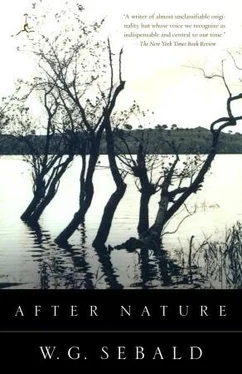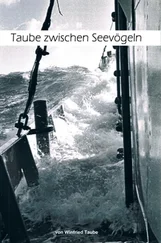into which without a word the breath
of legions of human beings had been absorbed.
And the water carried them downstream
together with salt and ashes
through the marshland out
to the sea. Those silent mutations
clear the way to the future.
In the course of three generations
the working classes of Manchester
had become a race of pygmies.
Volunteers who in war-time attempted
to escape into military service
were rejected by the selection boards
as unfit, unless they could be accommodated
in one of the so-called bantam battalions
which recruited diminutive soldiers from the city
and throughout the surrounding area.
In either case they were
part of the obscure crowds
who fuelled the progress of history.
From my workplace I thought
I could see the will-o’-the-wisps
of their souls, as with tiny lanterns
they haunted the rubbish dumps
of the City Corporation, a smouldering
alpine range which, it seemed to me,
extended into the beyond.
In the dusk I often saw
searchlight beams from
bulldozers creeping about there
that pierced the void, and aeroplanes,
our grey primeval brothers,
rose with infinite slowness
from the lagoon and the bogs.
I recall that these images
often plunged me into a quasi
sublunary state of deep
melancholia and that then
I heard the incessant monotonous
vibrations of a Jew’s harp
and repeatedly had to step out
of doors in my oppression.
Whole days long in the basement
of the university library I read
the works of Paracelsus, in which
it is written that from septentrion
nothing good emanates and
that the body is dyed
by illness like a piece of cloth
by an extraneous colour.
Often on my wanderings
through the streets I resorted
to one of the many infernally
glittering hostelries, for preference
to Liston’s Music Hall
where a radiantly blue-eyed,
down-and-out heroic tenor,
who always wore a winter coat
too long for him and a Homburg hat,
sang Tannhäuser arias accompanied
by a Wurlitzer organ. And to
the Gospel Chapels I went
from time to time, witnessing
how row after row of the sick
amid the congregation’s shrieking
were healed and even the blind
had their sight restored.
Once, while searching
for the star-shaped Strangeways
Prison, an overwhelming
panoptic structure whose walls
are as high as Jericho’s, I found
myself in a sort of no-man’s-land
behind the railway buildings, in a terrace
of low houses apparently due
for demolition, with shops left vacant,
on whose boards the names
Goldblatt, Grünspan and Gottgetreu,
Spiegelhalter, Solomon,Waislfish
and Robinsohn could be made out.
In the wind a door moved
as if as a sign. Stuck to it
was an old placard
for the musical Oklahoma!
The entrance to nature’s theatre
stood open. I still strained
to hear the ethereal waves
when with martial brass music,
bugle horns and drums,
a procession of olive-green
child soldiers marched
down the street, passed
by me and suddenly vanished
as though swallowed by the earth.
If I told Mr. Deutsch
about these things
he shook his head
and said: “Strange, very
strange.” Mr. Deutsch,
born in Kufstein, had come
to England as a child
in nineteen thirty-eight.
There were many things he could not
remember; some others he could not erase
from his mind. He had never
mastered the English language
although for years, day in
and day out, he followed
on TV with an expression of
the utmost attention the entire
evening schedule, as if
at any moment he expected
a message that would
change his whole life.
When, in the summer of last year,
I visited the engineer D. in Zürich
he was sitting by an open window
and kept turning a piece of feldspar
around in his hands. You see,
he said, outside, the garden grows rank,
my place now is in the midst of the foliage.
That reminds me of the migration
through the desert. How many machines
I’d built, how many works designed,
before I lost my belief
in the science I’d always served.
I had arrived at one of the dead
bays of time, like that Tatar
with the red headcloth and the white
curved feather, had climbed the mountain
and surveyed the city, as it lay
before me, a faded picture
of the great diluvium.
I sensed the trembling
of the aerials on the roofs
of houses as a frizzle
in my brain, could hear from far away
outside me
the Gaussian roar, an unremitting
sound extending over the whole scale
from the earth up to the heavens
where the stars drift
in the aether. Many
terrible midnights
of doubt have I passed
since that time, but now peace
returns to the dust and I read
in the descriptions of nature
of the eighteenth century how a
verdant land is submerged
in the blue shadows of the Jurassus
and in the end only the age-old
ice on the Alps retains a faint
afterglow. A strange light pervades
the lines of Haller and Hölderlin
and yet even here there is vagary
as far as the heart reaches. For
the revolutions of great
systems cannot be
righted, too diffuse are
the workings of power
the one thing always
the other’s beginning
and vice versa. Taurus
draconem genuit et draco
taurum, and nowhere
a stop. So you’d better be off,
said the engineer D., this very day.
The country’s on fire already and everywhere
the forests are ablaze, there’s a crackling
of fire in the fanned leaves
and the drought-stricken African
plains are expanding. Still
perhaps on your travels
you’ll see a golden coast
a land veneered with rain or
a schoolboy on his way home
over a beautiful meadow. Then
another joy will have been lived,
thinks one who recovers a little.
The shady shore of a lake
emerges, the water’s surface,
the ribbons of rocks and
on the highest summit the dragon’s
many-coloured plumage, Icarus,
sailing in the midst of
the currents of light. Beneath him
time divides the Rhine glacier
into two mighty branches,
the Churfirsten peaks emerge,
the Säntis range rises,
chalk islets, glowing
bright in drifting ice.
If his eyes are now
lowered, if he falls
down into the lake,
will then, as in Brueghel’s
picture, the beautiful ship,
the ploughing peasant, the whole
of nature somehow turn away
from the son’s misfortune?
These questions carry me
over the border. On the Arlberg
a thunderstorm gathers.
I gaze down into the valley
and my soul is sent reeling.
Another summer gone by and
as ivy hangs down, Hölderlin wrote,
so does branchless the rain. Moss roses
grow on the Alps. Avignon sylvan.
Across the Gotthard a horse gropes its way.
When morning sets in,
the coolness of night
moves out into the plumage
of fishes, when once more
the air’s circumference
grows visible, then at times
I trust the quiet, resolve
to make a new start, an excursion
perhaps to a reserve of
camouflaged ornithologists.
Читать дальше












